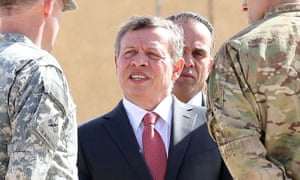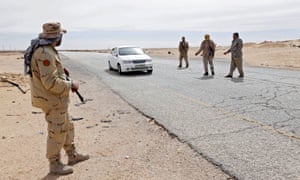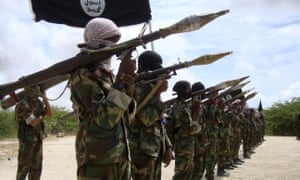King Abdullah of Jordan indicates US was briefed about plans for Jordanian special forces to operate alongside British
The Guardian
SAS forces have been deployed in Libya since the beginning of the year, according to a confidential briefing given to US congressional leaders by the king of Jordan.
A leaked memo indicates the US lawmakers were personally briefed by King Abdullah in January about plans for Jordan’s special forces to operate in the country alongside the British.
According to the notes of the meeting in the week of 11 January, seen by the Guardian, King Abdullah confirmed his country’s own special forces “will be imbedded [sic] with British SAS” in Libya.
According to the memo, the monarch met with US congressional leaders – including John McCain, the chairman of the Senate armed services committee, and Bob Corker, the chairman of the Senate foreign relations committee. Also present was the House of Representatives speaker, Paul Ryan.
King Abdullah said UK special forces needed his soldiers’ assistance when operating on the ground in north Africa, explaining “Jordanian slang is similar to Libyan slang”.
The king also highlighted that British forces had helped in building up a mechanised battalion in southern Syria, headed by a local commander and made up of tribal fighters, to combat Bashar al-Assad’s army, and that his troops were ready with Britain and Kenya to go “over the border” to attack al-Shabaab in Somalia.
When contacted, the Ministry of Defence said it did not comment on special forces’ operations. None of the high-ranking US senators contacted by the Guardian responded to a request for interview.
However, one senate source confirmed US lawmakers met with the king in a private meeting in early January but refused to confirm “what may or may not have been discussed”.
The full passage of the briefing notes says: “On Libya His Majesty said he expects a spike in a couple of weeks and Jordanians will be imbedded [sic] with British SAS, as Jordanian slang is similar to Libyan slang.”
The monarch’s apparent openness with the US lawmakers is an indication of just how important an ally Jordan is to the US in the region. Since the 1950s Washington has provided it with more than $15bn (£10.5bn) in economic and military aid.
However, the Jordanians had become frustrated over perceived US inaction over the Middle East in recent months. Five years of fighting in Syria have dramatically impacted on Jordan, which has absorbed more than 630,000 Syrian refugees, and the king has repeatedly called for decisive action to end the conflict.
He told those present: “The problem is bigger than Isil [Islamic State], this is a third world war, this is Christians, Jews working with Muslims against outlaws.”
The memo indicates that Abdullah also told US lawmakers:
• The Turkish president, Recep Tayyip Erdoğan, “believes in a radical Islamic solution to the problems in the region” and the “fact that terrorists are going to Europe is part of Turkish policy, and Turkey keeps getting a slap on the hand, but they get off the hook”.
• Intelligence agencies want to keep terrorist websites “open so they can use them to track extremists” and Google had told the Jordanian monarch “they have 500 people working on this”.
• Israel “looks the other way” at the al-Qaida affiliate Jabhat al-Nusra on its border with Syria because “they regard them as an opposition to Hezbollah”.
The king raised particular concerns over al-Shabaab, the Islamist militant group in Somalia that has links with both Isis and al-Qaida.
“Jordan is looking at al-Shabaab because no one was really looking at the issue, and we cannot separate this issue, and the need to look at all the hotspots in the map,” he said, adding: “We have a rapid deployment force that will stand with the British and Kenya and is ready to go over the border [into Somalia].”
Abdullah said “we started with al-Shabaab, as they feed into Libya”, which has descended into chaos since the overthrow of Muammar Gaddafi by Nato forces.
In Britain, it is the Jordanian monarch’s confirmation of the SAS operating with his forces in north Africa that will raise eyebrows.
The issue of the oversight of the operations of British special forces has become a vexed matter in parliament. Earlier this week, David Cameron rejected a call from Angus Robertson, the Scottish National party’s Westminster leader, for the SAS to be subject to parliamentary oversight, saying they were already “subject to international law as everyone else is in our country but I do not propose to change the arrangements under which these incredibly brave men work”.
Crispin Blunt, the foreign affairs select committee chair, who has been concerned that parliament has been left in the dark about British involvement in Libya, told the Guardian he had known King Abdullah since they both served in the 13th/18th Royal Hussars.
“King Abdullah gives a level of insight that we don’t get from our own governments,” said Blunt. “He has given presentations to parliamentarians behind closed doors in the past. We don’t get that from our own ministers. When [the foreign office minister] Tobias Ellwood told us about RAF flights over Libya these were plainly in support of special forces missions. But when we asked for details we were told the government doesn’t comment on special forces.
“There is a tendency for the British establishment to work out everything very carefully and then present it to parliament as ‘a take it or leave it’ choice. And then ministers wonder why they have difficulties in parliament.”
In March, intelligence analysts at Stratfor said UK special forces were already in Libya and “escorting MI6 teams to meet with Libyan officials about supplying weapons and training to the Syrian army and to militias against the Islamic State. The British air force bases Sentinel aircraft in Cyprus for surveillance missions around [the Isis Libyan stronghold] Sirte as well.”
Accusations that Cameron’s lax attitude to Libya contributed to the country’s disastrous collapse resurfaced after Barack Obama suggested in an interview with Atlantic magazine this month that the chaos in north Africa was caused in part because the British prime minister was too distracted to oversee a smooth transformation to a new stable regime.
However, in recent weeks there has been a flurry of international activity to stabilise Libya, with British officials prominently pushing a peace process. Under a plan disclosed late last year, the UK will offer the new Libyan government 1,000 troops as part of an internationally coordinated effort.
Blunt says he has called on Cameron to give evidence to his committee, writing to Downing St to say that “given the prime minister’s key role in the development of international policy before, during and after the 2011 intervention – a role which is continuing now with the formation of the government of national accord – the committee believes it is only appropriate to extend this invitation to you in a spirit of courtesy, fairness and genuine inquiry”.
When contacted, Downing Street did not respond to questions about whether the prime minister would give evidence to MPs.
Jordanian embassies in London and Washington did not comment on the leaks.





1 comment:
balenciaga speed
yeezy shoes
ferragamo belts
jordan shoes
balenciaga sneakers
yeezy boost
michael kors handbags
calvin klein outlet
christian louboutin outlet
bape hoodie
Post a Comment